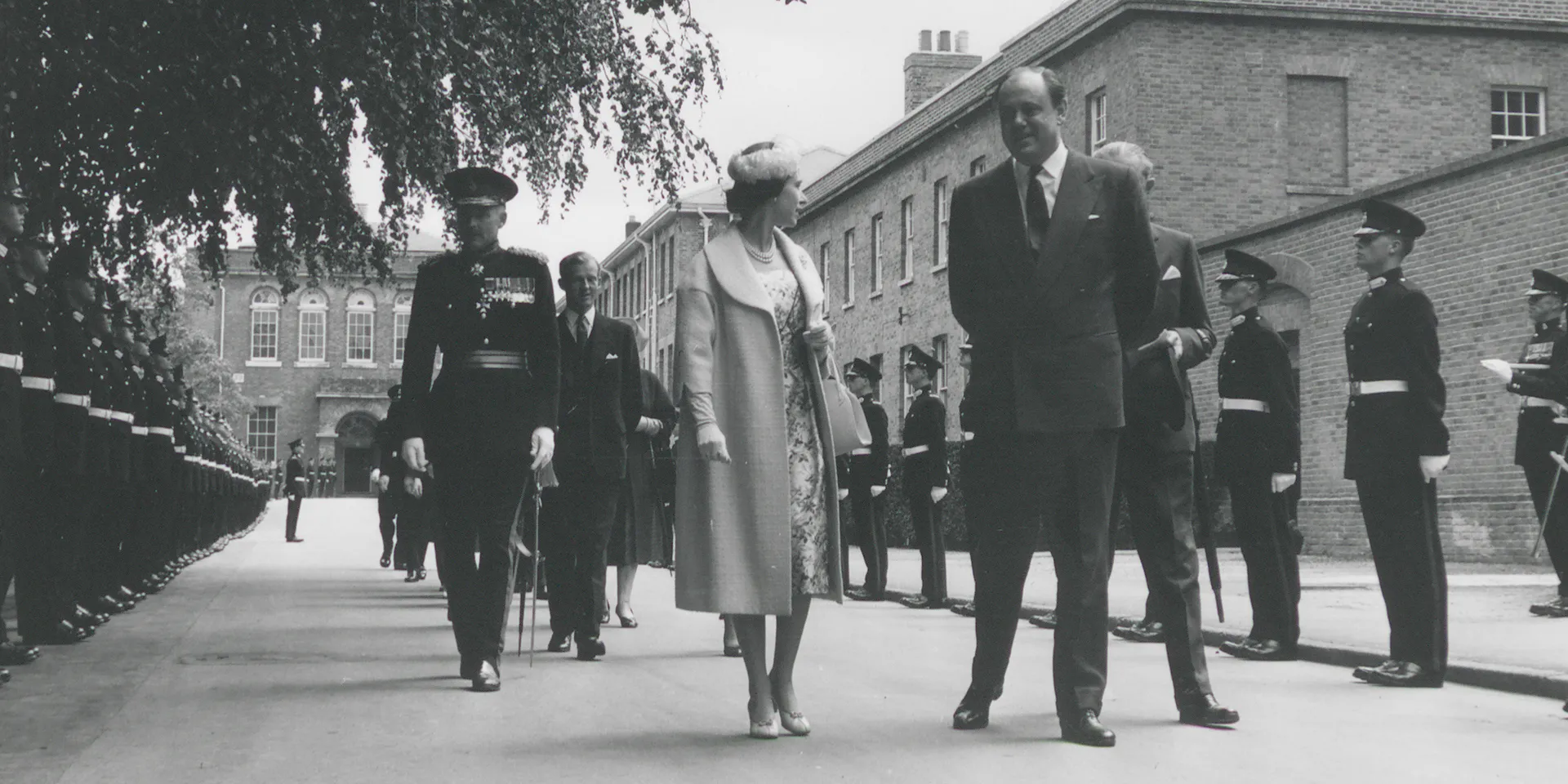
Queen Elizabeth II, Royal Opening, 15 July 1960
Queen Elizabeth II
On 15 July 1960, Queen Elizabeth II opened the newly founded National Army Museum at the Royal Military Academy Sandhurst.
This was the first of several visits, including further official openings in 1971, when the Museum relocated to Chelsea, and again in 2017 following a major redevelopment project.

Queen Elizabeth II, Royal Opening, 11 November 1971

Queen Elizabeth II, Royal Opening, 16 March 2017

Queen Elizabeth II, Royal Opening, 15 July 1960
Royal Family
Other members of the Royal Family have also supported the Museum over the years. The Duke of Gloucester agreed to become the first patron of the Museum in 1960. The Duke of Kent then took over that role in 1976.
As well as accompanying Elizabeth II, the Duke of Edinburgh made his own private visit to the new building in Chelsea in 1970, before the galleries had even been completed.

The Duke of Gloucester (second from left), 1962

The Duke of Edinburgh, 1970
Other royals have attended specific exhibitions. In 1976, the Queen Mother came to see a display of the decorations and orders awarded to her brother-in-law, the Duke of Windsor.
In 2011, the Duchess of Cornwall (now Queen Camilla) attended the opening of the War Horse exhibition. She returned in 2018 for a display of Alfred Munnings' wartime paintings.

The Duke of Kent (left), 1981

The Duchess of Cornwall at the Alfred Munnings exhibition, 2018

The Queen Mother with Field Marshal Sir Gerald Templer, 1976
Military
Military figures have always been associated with the Museum. Field Marshal Sir Gerald Templer, Field Marshal Sir Claude Auchinleck and General Sir Hubert Gough were all driving forces behind its founding.
The Museum has also long held connections with the Duke of Wellington and his family. The 8th Duke, Valerian Wellesley, is shown here in 1986 attending the Patriots and Liberators exhibition.

Field Marshal Sir Claude Auchinleck (left), 1956

The Duke of Wellington (right), 1986

Field Marshal Templer (left) and General Gough (seated), 1962
Politicians
John Profumo MP had a role on the first Museum Council as Secretary of State for War. Other notable politicians to have visited include Sir Edward Heath, while serving as prime minister in 1972, and Muhammad Khan Junejo, while prime minister of Pakistan in 1987.

Secretary of State for War John Profumo (right) with Field Marshal Slim (left), 1962

Prime Minister Edward Heath (third from right) with Field Marshal Templer (second from right), 1972

Muhammad Khan Junejo, the prime minister of Pakistan, 1987
Arts and entertainment
Galleries and exhibitions have also attracted an interesting blend of famous faces from the world of arts and entertainment. Indeed, Sir Michael Morpurgo worked with the Museum on the War Horse exhibition, based on his novel of the same name.
In 2011, Dame Vera Lynn attended the opening of Wives and Sweethearts. And in 2013, Bruce Dickinson, the lead singer of Iron Maiden, paid a visit to Britain's Greatest Battles.

Bruce Dickinson, 2013

Dame Vera Lynn (seated centre), 2011

Sir Michael Morpurgo (right), 2011
Institutional Archive
This story is illustrated with images from the National Army Museum's Institutional Archive. To mark our 60th anniversary, we are making the catalogue of this archive available to researchers online for the first time.
The catalogue provides information about records created by the Museum since its founding in 1960, including its early existence at the Royal Military Academy Sandhurst. It covers a range of categories, from governance to collection records, events to building records, as well as photographs and posters.
We will be publishing further catalogue records over time, establishing what we hope will prove a useful resource for researchers of museology and military history.



